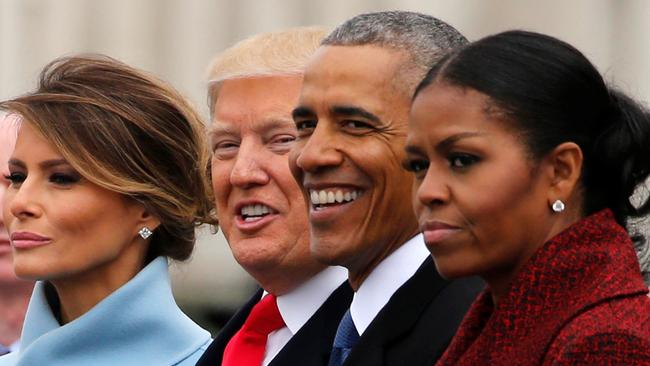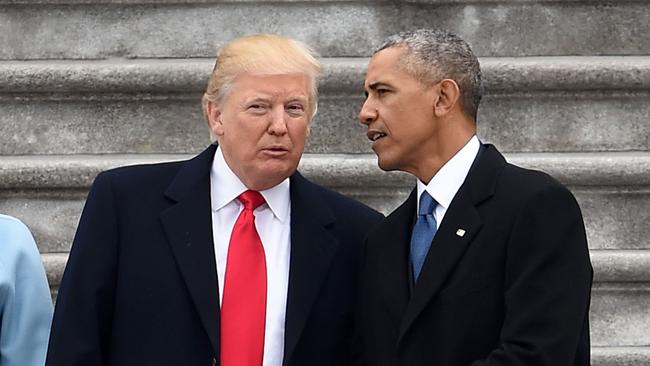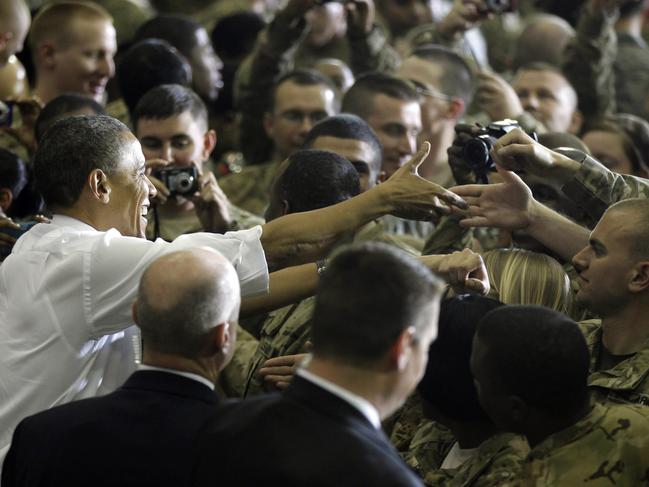Obama and Trump: Two sides of the coin
As this turbulent decade in US politics dominated by Trump and Obama ends, it may be that the greatest disruption still lies ahead.

It was dark, raw and defiant, and it signalled that US politics would never be the same again.
Donald Trump’s inauguration speech on January 20, 2017, shook the Washington establishment to its core. The newly sworn-in President portrayed the US as a broken, forlorn nation exploited by its allies and blighted by “rusted-out factories scattered like tombstones” across the country. He spoke bleakly of “American carnage” and of a “forgotten generation of men and women”.
“From this day forward,” Trump declared, “it’s going to be only America first.”
Behind Trump sat a grim-faced Barack Obama, who was learning, like the rest of the country, that this 45th President would be like none other. He would seek to disrupt not only the norms of US politics but much of Obama’s eight-year legacy.
As this most turbulent of decades in US politics comes to a close, dominated by two polar opposites in Trump and Obama, it may be that the greatest disruption still lies ahead.
The US has changed but so has the world, and the rise of populist, nationalist leaders is a global rather than only an American phenomenon.
But no populist leader has been a disrupter-in-chief like Trump. The former billionaire real estate mogul has recast the way the US deals with the world and with itself, tapping into the restless frustration of regional and rural Americans who have felt left behind and mocked by their left-leaning city brethren.

It has been a grassroots political revolution powered by grievance and led in chaotic, street-fighting fashion by Trump. It has helped to more sharply cleave America into two parts, although that phenomenon precedes Trump.
One America, which resides mostly in Democrat-dominated cities and suburbs and is backed by most mainstream US media, detests this deeply unconventional President and all he stands for. The other America, poorer, whiter and based outside the cities, sees him as its warrior who fights for the things it cares about: jobs, border security, church, abortion, guns and the flag.
That part of America that turned to Trump in 2016 did not appear overnight and was not created by Trump. Rather, it was a movement that was growing in plain sight during the early half of the decade under Obama’s presidency but was mostly ignored or underestimated by the Democrats and a city-based, left-leaning US media.
Obama had come to power in 2008 after inheriting an economy in recession, battered by the financial crisis, and also two unpopular wars in Iraq and Afghanistan.
His presidency saw a gradual but painfully slow, eight-year economic recovery. When voters became frustrated by what they saw as Obama’s overselling of his “yes we can” promises for change, they punished him at the 2010 midterm elections, capturing the House of Representatives. Obama had already enacted his signature domestic reform of the health system — the creation of the Affordable Care Act, dubbed Obamacare — but he would never enjoy a congressional majority in both houses again, forcing him to rely on executive orders to incrementally carry out his mandate.

On the global stage Obama was a traditional multilateralist, signing on to the Paris climate accord and the Iran nuclear agreement while normalising relations with Cuba. His promise to end the wars in Iraq and Afghanistan were fraught. Obama made the mistake of withdrawing US forces too fast from Iraq, creating a void that was brutally filled by the new terror movement call Islamic State. In Afghanistan he ordered a surge of US troops in the hope of finally breaking the Taliban but it ended in a stalemate that continues today. Even so, voters in 2012 decided Obama had done enough to deserve a second term and elected him over his mainstream Republican opponent, Mitt Romney.
By the time Obama left office in 2017 he had presided over a drop in unemployment from about 9 per cent in 2010 to only 5 per cent and had created 11.3 million jobs. But this slow recovery also hid a dark truth. Income and wealth among America’s working class remained stagnant. They were not sharing in the broader economic recovery. Technology and changing tastes were slowly killing America’s manufacturing heartland of the midwest. Factories closed, destroying small towns that relied almost entirely on a single steel factory or auto plant. Politics also contributed. The coal industry became a victim of Obama’s push for renewable energy, hitting a generation of coalminers.
Obama, when campaigning for president in 2008, visited Janesville in Wisconsin and predicted that the town’s huge General Motors plant would go on for another 100 years. “The promise of Janesville is the promise of America,” he told the workers.
Five months later, the plant was closed, a victim of the global financial crisis. It plunged Janesville into a spiral from which it never recovered. When The Australian visited Janesville last year the giant empty GM plant was being bulldozed. Because of stories such as Janesville, Trump in 2016 became the first president to win Wisconsin since 1984.
By the time Trump ran for president he had identified the grievances of those workers in middle American who felt economically and culture disenfranchised from the rest of the country. To these voters, the Democrats had shifted from their working-class roots to become a party of inner-city progressives.
Then Trump came along and spoke to them in a language they understood.
“The voter anger came from frustration that people were missing out,” Australia’s ambassador to the US Joe Hockey told The Australian. “Vast chunks of America were well over having a lecture on morality from Washington or the media in New York or Los Angeles on a regular basis.
“Suddenly their jobs in coalmines became immoral. Suddenly their carrying of a gun became immoral. They were painfully inadequate for the community if they hadn’t gone to university or if they had a job that was not paying enough. There was this quiet revolution that was building among blue-collar workers that they were expected to feel guilt.
“Then Donald Trump comes along … and says to them: you are a great person and I’m going to make you great again and you’ve been totally forgotten. He showed that someone was listening to them.”
Populists such as Steve Bannon were in Trump’s ear framing the culture war as a war against the entrenched powers of Washington itself, with its politics of patronage, special interests and its “deep state” intelligence and military industrial complex.
“There is a growing global anti-establishment revolt against the permanent political class at home and the global elites that influence them,” Bannon said as early as 2014. His views helped shape Trump’s election message in 2016 when he campaigned on an “us v them” platform, promising to fight for American workers against the elites of Washington and to put “America first” on the global stage.
It greatly helped Trump that his opponent, Hillary Clinton, was deeply unpopular outside of the Democrat-dominated cities. Many voters viewed her and the Clinton political dynasty as symptomatic of the sort of entrenched interests that Trump said he was fighting against. Trump won the election in defiance of the polls and of the US media that mostly did not see it coming.
“Clearly the intellectual elites were surprised (at his 2016 victory), just as they were with Brexit,” says Mike Green, who served on the National Security Council under president George W. Bush and is now senior adviser at Washington’s Centre for Strategic and International Studies.
Green says people underestimated how the conservative attitudes of rural and regional Americans were splitting from those of the more liberal big cities.
“Over the last 10 years that divide has grown and I think people missed that,” he says. “Politicians and pundits were not paying attention to small-town America, where growth is slower, many people can’t sell their houses without losing money. It was about economics, but identity too, and it breaks down more along education and race than income. It’s about fear of change and Trump was the change agent to stop the change.”
In his first three years in office, Trump has shaken up US politics more than any other postwar president. He is America’s first Twitter president, bypassing traditional media to speak directly to voters. He has declared war on traditional left-leaning media outlets such as The New York Times, The Washington Post, CNN and MSNBC, deriding them as “fake news” and “the enemy of the people”. In doing so, he has transformed the nature of the political debate, often turning verifiable facts into contestable ones for his own political purposes.
On the global stage he has been no less unorthodox, forging the most unlikely personal connections with Korean dictator Kim Jong-un and taking on China in a 1970s-style tariffs war over its unfair trading practices. He has reversed key aspects of Obama’s foreign policy by withdrawing from the Iran nuclear deal and the Paris Agreement and eschewing multinational trade agreements such as the Trans-Pacific Partnership. He often has been tougher on allies such as the EU, Canada and Mexico than on adversaries such as Russia and North Korea.
Trump also has remade the Republican Party in his own image, ending its decades-long support for free trade, immigration and deficit reduction. He has pushed through big cuts to business and personal taxes, fought to build his promised border wall with Mexico and pushed conservative judges on to the Supreme Court. But he also has suffered losses in last year’s midterm elections that saw the Democrats win the house.
The economic recovery that began under Obama has bloomed under Trump, with solid economic growth and unemployment at 50-year lows.
Hockey says the rise of both Obama and Trump shows how in this decade political ideology has become less important than character. “My view is that character has more cut-through than ideology these days,” he says. “People aren’t interested whether you are left or right, they are more interested in what your character is and whether you are authentic. The thing about Barack Obama is that he was authentic and the thing about Donald Trump is that he is authentic, whether you agree with them or not.’’
Hockey believes the next decade will prove no less tumultuous in US politics regardless of whether Trump is re-elected next year.
“The world has changed and it has changed for a generation,” he says. “America will be predictable in its unpredictability.”
Hockey says that with the US economy in its 12th year of growth, the longest continuous stretch since World War II, there will eventually be a recession and this will further fuel voter resentment towards the political system.
“It will confirm their views about government. It’s not going to make them global free traders or be concerned about climate change or to hand in their guns.”
Regardless of whether Trump gets a second term, the economic, cultural and political differences between the cities and small-town America are now entrenched. These alone will guarantee a divided nation in the decade ahead.
The Democrats, having been caught off-balance by the rise of Trump, cannot decide how best to win back those Democratic voters who defected to him in 2016. The party’s left wing argues that Trump’s success shows that traditional, incremental political leadership is dead. They say the next Democratic presidential nominee must capture the attention of Americans with a bold and revolutionary agenda such as that promoted by Elizabeth Warren or Bernie Sanders.
The party’s moderate wing, personified by frontrunner and former vice-president Joe Biden, says the era of Trump is a one-off and that it is possible to turn the clock back to a calmer, more traditional style of presidency.
But this decade may have changed US politics permanently. The country is muddling through an impeachment saga and is split, largely along party lines, about the rights and wrongs of impeaching the President over the Ukraine controversy. It has suffered through the partisan wars triggered by special counsel Robert Mueller’s Russia investigation and it is gearing up for what promises to be yet another politically bruising election campaign.
The country is more divided than it has been for a generation and this next decade promises to be no less volatile than the last.
Cameron Stewart is also US contributor for Sky News Australia.





To join the conversation, please log in. Don't have an account? Register
Join the conversation, you are commenting as Logout